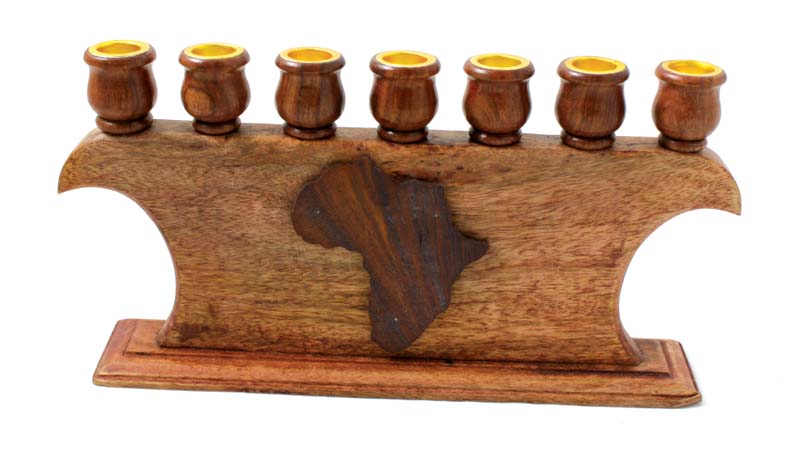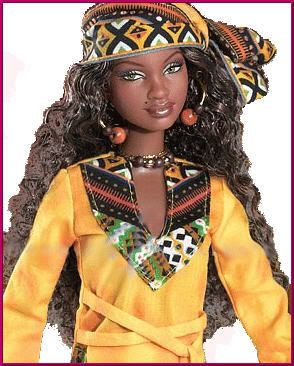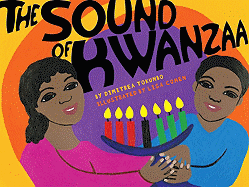
As reported by the Philadelphia Inquirer, by Jenice Armstrong, "Fewer African-Americans are observing Kwanzaa - why?" on 21 December 2010 -- I ASKED A 17-year-old I know what he thought about Kwanzaa and he said, "That Jewish holiday?"
Uh, no.
Clearly, his high school hasn't embraced the multicultural thing and isn't teaching students about the 44-year-old Afrocentric holiday. But I don't knock his ignorance because the truth is that Kwanzaa has never caught on with the majority of black Americans. At the same time, though, it has grown in mainstream acceptance as evidenced by the Kwanzaa postal stamps and greeting cards.
No one can say for certain how many people celebrate Kwanzaa, which began in 1966 and has roots in the Black Nationalist movement. Keith Mayes, author of "Black Power and the Making of the African-American Holiday Tradition" (Routledge, 2009) said that conservative estimates are that between 1 million to 2 million African Americans celebrate Kwanzaa. Organizers of The African American Cultural Center in Los Angeles put the figure at 40 million worldwide but that includes similar festivals in Africa and elsewhere.
"I don't know if the numbers continue to increase every year. I would say that it may have leveled off," Mayes said. "It just no longer shows up in some of the places that it did 30 to 40 years ago. You still have people who actually celebrate it. You have third generations of Kwanzaa celebrants . . . but Kwanzaa no longer has its movement which brought it forth, which is the black power movement. That movement has waned."

At the same time, though, many cultural institutions such as the African American Museum in Philadelphia, which is planning a number of celebrations at the Gallery at Market East, have embraced it. For mainstream organizations, Kwanzaa has become a stand-in for African-American traditions and it has become almost obligatory to lump Kwanzaa in with Hanukkah, Christmas, Three Kings' Day and other December holidays. Some years back, I was volunteering at a local public elementary school and overhead a teacher telling students that Kwanzaa is a holiday celebrated by black people.
Really?
Most black families don't hold personal Kwanzaa observances, which typically involve the lighting of a candle every day from Dec. 26 to Jan. 1, representing the seven principles of the festival. On Friday, when I asked folks on Facebook why more African-Americans haven't embraced the holiday, I got some heated answers. Some respondents said people were ignorant about what it is and how to celebrate it, and others felt that Kwanzaa was just another manufactured holiday.

As for me, Kwanzaa has never been part of my family's traditions. I've mentioned it from time to time, and my siblings say, "Hey, that sounds like a good idea," but we have never gotten around to actually organizing a celebration. And by admitting this, I'm sure there are those who will accuse me of being less than black, the same way they did when I wrote about how I choose to wear my hair. But no one should feel compelled to jump on a holiday bandwagon just to prove their ethnicity.
Kwanzaa, which means "first fruits" in Swahili, is a lovely tradition for those who choose to embrace it. I have a friend in Mount Airy who regularly throws big Kwanzaa bashes that I've attended sporadically over the years. For my friend, who is Yoruba and doesn't celebrate Christmas, Kwanzaa is a way to extend the joy of the holiday season to her daughter. Her family's annual gatherings include joyful potluck meals.
One year I attended and I remember being touched by the young children who wandered around the room asking adults to explain the principles of Kwanzaa such as umoja, which is Swahili for unity, and nia which stands for purpose. Although I goofed at my first celebration by bringing the host's daughter a Barbie doll, I actually like that Kwanzaa hasn't been usurped by Walmart and other retailers.

"It seems to me you have to care about blackness above and beyond the everyday to celebrate Kwanzaa, and while there are plenty of conscious black people who do so, of all socioeconomic strata, I don't see it taking off . . . because in order to have the black masses participate in large, noisy numbers, Kwanzaa would have to be simplified and made easy and consumer-friendly, and would then presumably lack the educational aspect of the holiday," pointed out Bertram D. Ashe, an associate professor of English and American studies at the University of Richmond. "I don't see that happening. That's simply not the way it was designed when Ron Karenga founded the ritual in the mid-1960s, and I don't see that changing anytime soon, nor should it."
Perhaps Kwanzaa would have been adopted by more people if Karenga, a former college professor, had arranged for it be commemorated during Black History Month or even in June instead of December. Let's face it, Christmas is all-consuming. According to Karenga's website, officialkwanzaawebsite.org, Kwanzaa isn't an anti-Christmas celebration but "a cultural one with an inherent spiritual quality as with all major African celebrations." But as a Facebook friend pointed out, no matter how well-intentioned, an individual can't declare Kwanzaa a black holiday and expect the masses to adopt it.

"It appealed to a generation of people who are now in their 50s and 60s," said Charles A. Gallagher, a professor of sociology at La Salle University. "It doesn't resonate in many ways with a lot of young people today. It's the same argument that you hear with the NAACP. For me, they are still sacrosanct. But you hear a lot of young people saying the NAACP is irrelevant.
"Kwanzaa just doesn't resonate with young people because they don't understand the political and sociological reverberations of when it was developed," he added.
And then there are those such as John Childress, New Jersey-based father of two teenagers, who has taken his children to a couple of Kwanzaa celebrations but still can't get past the Kwanzaa founder's 1971 conviction for torture.
"Your mind tells you that something great can come from someone of a poor background, but at the same time I look at it as 'what's up?' " said Childress. "It's not like these are African traditions that we kept up through slavery. It would be different it if were a tradition we'd been practicing all the way through. Most blacks are Christians and sometimes it feels like Kwanzaa is trying to take away from Christmas."

Then there are those such as Blair S. Walker, co-author of "Why Should White Guys Have all the Fun?: How Reginald Lewis Created a Billion-Dollar Business Enterprise," who for years made a point of celebrating Kwanzaa when his daughters were younger. But he's given up.
"If you ask them to tell you the principles, you'd get the 1000-yard stare," Walker said. "We are living in an 'American Idol'-type of era. People can't even name the secretary of state, so you know they don't know anything about Kwanzaa." (source: Philadelphia Inquirer)


It's really very difficult iin this full off acctivity life to listen news on TV, therefofe I only use the web for that purpose, and take the most recent news.
ReplyDeleteHere is my web blog 企業活動
Are you looking for free Google+ Circles?
ReplyDeleteDid you know you can get these ON AUTOPILOT AND TOTALLY FOR FREE by using Add Me Fast?
There is a chance you're qualified to get a free $500 WALMART Gift Card.
ReplyDeleteI am glad that it turned out so well and I hope it will continue in the future because it is so worthwhile and meaningful to the community. happy birthday happy birthday bro birthday wishes gaming laptops best gaming laptop
ReplyDelete